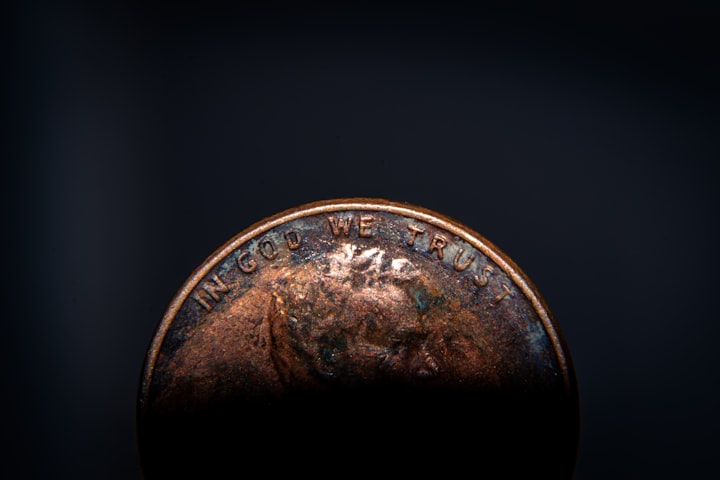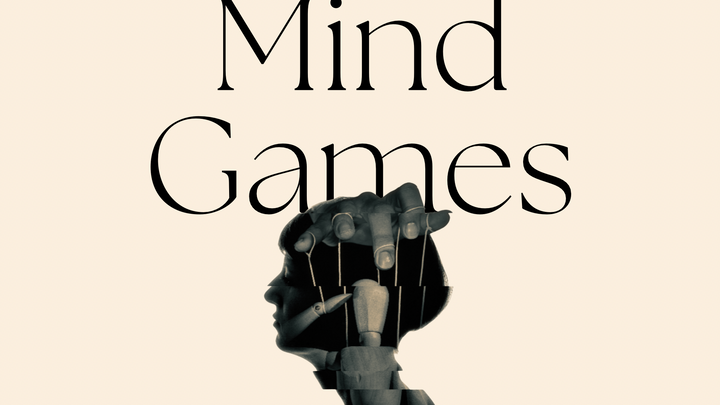Cain You Earn Your Way to Heaven? Are you Abel to Save Yourself?
Have you ever done something kind and generous for someone only for it to be met with ungratefulness or a lack of appreciation? If you're a parent, you experience this daily. If you're God, You experience this constantly.

“When it was time for the harvest, Cain presented some of his crops as a gift to the LORD. Abel also brought a gift—the best of the firstborn lambs from his flock. The LORD accepted Abel and his gift, but he did not accept Cain and his gift. This made Cain very angry, and he looked dejected.” — Genesis 4:3-5 (NLT)
Have you ever wondered why God accepted Abel’s gift, but had “no regard” for Cain’s? The answer may appear pretty simple if you simply take the text at face value, but I think there is more nuance to this story.
The way that it's always been taught to me is that Cain brought an inferior variety of berries, or he only brought the portion of the harvest that had blemishes, or something like that. Essentially, his gift wasn't good enough because it wasn't the firstfruits. It wasn't his best. It was his leftovers. We've all heard the cringe-worthy sermons from greedy pulpits.
First of all, considering what we're able to grow today, I’m sure the fruit Cain brought to God was impeccable and would have prompted a mile-long line at the world's bougiest farmers markets. They weren't in Eden anymore, but the ground wasn’t worn out like it is today. The air wasn’t polluted. There weren’t all the pests and pestilences that we are fighting off today. The ground was more fertile than ever; it was yielding its strength. The air was clean and pure. Everything was primed for an abundance of agricultural pleasures. On top of that, Cain was only the second man to ever work the ground. Yet, here we are today, with a 6,000 year old earth, no longer yielding its full strength, sowing and reaping a bounty of beautiful, succulent crops season after season, even without the use of harsh chemicals, even in the world's poorest countries.
Perhaps, the only reason God didn't respect Cain's gift was because he didn't offer his best. Maybe that's it. But the more I think about it, the more I'm convinced that there wasn't anything necessarily wrong with the fruit itself. I don't imagine that Cain offered his leftovers to God. If he did, he'd have no logical reason to be "very angry" and "dejected".
Can you imagine getting upset with, or offended by, a dinner guest who had little to no regard for the cold plate of leftover spaghetti you put in front of him while you're seated across the table fixin' to sink your teeth into a juicy, perfectly smoked, tender rack of St. Louis style ribs with a side of warm, fluffy sweet potato soufflé and oven-roasted Brussels sprouts tossed with Dijon mustard? Of course not. You'd never dishonor your guest like that.
Cain didn't offer God his leftovers. Cain offered his very best. He was obviously quite proud of what he had to offer. He thought God would be, too. He was wrong.
God Speaks To Us Through His Word
It is so important that we study the Word of God, and not simply read it. God instructed Joshua to not let His Word depart from his mouth, and that he should meditate on it day and night, and never turn from it, so that he would have good success and prosper in everything he did. He also told Joshua that He would be with him and never forsake him.
Hm, that's interesting. Yes, God is omnipresent. However, if you have the Word of God written on your heart to the point where it's a part of your everyday speech, then, in a very real and practical sense, God will always be with you and He cannot forsake you.
Meditating on God's Word should not become just some ritual of reading the words; it's not a mantra. Meditating on God's Word is about getting to know Him as Lord and as Father. It's deliberately focusing all our attention on Him and seeking to understand all the things He wants us to understand.
It is so important that we study the Word of God, and not simply read it.
There are some things that God doesn't want us to know or understand—at least not yet. He told the prophet Habakkuk that he "would not believe" the work He was doing even if He told him. Paul said he was not allowed to utter the words he heard when he was caught up into Paradise. And to John, God said, "Seal up the things which the seven thunders uttered, and do not write them down."
I don't know about you, but I find great comfort in worshipping a God who cannot be fully understood. If it were possible to fully comprehend God, then I don't think He'd be much of a god at all, to be honest. When you come to understand that, you'll have a better understanding of God. Understand?
Cool. Cool, cool, cool.
Think about it like this. When I was in graduate school at ETSU, there was a professor who would talk right over my head. He didn’t do it intentionally, although many do. He simply possessed more intellect than I—and his own peers, for that matter. He wasn't even mean, he was just on a whole other level. Not God's level, of course, but you know what I mean.
So he would talk, and I would nod, not really understanding, too intimidated to ask a question. That would come back to bite me later on, especially when exams rolled around. My professor was under the impression that I understood the material. If you don't ask questions, people will assume you understand what they're saying. Strange, I know.
If you don't ask questions, people will assume you understand what they're saying.
The appropriate thing—the wise thing—to have done in that situation would have been to say, “Excuse me. I don’t quite understand that. What do you mean exactly? Can you explain that a little more, please?” This takes courage, and so does studying and practicing the Word of God.
If you're having trouble understanding God's Word, He says, "Ask and it will be given to you; seek, and you will find; knock, and it will be opened to you," Matthew 7:7 (ESV). James said, "If any of you lacks wisdom, let him ask God who gives generously to all without reproach, and it will be given him," James 1:5 (ESV). Never be so angry with God that you refuse to question Him, and never be so proud that you refuse to listen.
What happens when we don’t understand the Bible or when we aren't hearing from God is we tend to get frustrated and walk away; we might even accuse His Word of error and His existence of a farce. But when you decide to not be lazy and actually study the Bible, letting scripture interpret scripture, what you’re saying is, “Hm, I don’t fully understand, God. Can you please explain?” God loves when we take on this kind of posture. He loves when we seek Him. What's more, He loves letting us find Him, and He loves to answer our prayers.
Never be so angry with God that you refuse to question Him, and never be so proud that you refuse to listen.
Hey, Did You Get My Text?
It's always important to remember, especially when studying a book like Genesis, that the people in the Bible didn't have the Bible. Sure, as time passed, God's words were written down and preserved, only to be disregarded by future generations, of course. However, by and large, they were ignorant. They certainly didn't have His whole Word, so they didn't have a complete picture. They were unable to solve the mystery of God.
Like it or not, the Bible is how God talks to us today. It is no coincidence that God refers to His Word as His Word. It is literally everything He wanted to say to us—and is still saying to us. In a world where everyone is texting each other, you would think we would grasp this much better. The problem, I think, is that we've gone from text messaging to instant messaging, and rarely does God respond instantly to us.
What Is Right, Anyway?
What we have here, for me, anyway, is something God said that is hard to understand. Cain obviously didn’t understand either. Unfortunately, God doesn’t really give us a straight answer in this particular passage. He simply asks Cain why he is angry and then tells him he’ll be accepted if he does well, or, in some translations, if he does what is right.
If he does well? If he does what is right? What is that supposed to mean?
God, he brought you the best fruit of the ground. Cain was a gardener, not a shepherd. Did you really expect him to offer You that which he did not even have? Peter did not offer to the lame man what he did not have. He gave him the only thing he did have, which was the power of the Holy Spirit.
Sometimes, what we think is right isn't what God thinks is right. Actually, that's most of the time. That's why the prophet Isaiah wrote, "For My thoughts are not your thoughts, Nor are your ways My ways,” says the LORD," Isaiah 55:8 (NKJV).
What's going on here exactly? What is right, anyway?
Pride Comes Before The Fall
In his verbal commentary on Genesis, Dr. J. Vernon McGee calls attention to how the writer of Hebrews explains, “By faith Abel offered to God a more acceptable sacrifice than Cain, through which he was commended as righteous.”
Have you ever wondered why Cain didn’t go to Abel and say, “Hey, bro, give me one of those more acceptable sheep that you gave to God,”? Cain was the older brother. I'm sure he could have coerced Abel to comply, if not by force then by trading some of his fresh organic produce. But I think Cain thought his gift was just as good as Abel's, if not better.
As Dr. McGee postulates, the whole problem here is that Cain denied that he was separated from God by sin and he demonstrated this by acting as though everything was alright between him and God, and that God was somehow in the wrong for not accepting his gift. In other words, Cain was prideful.
At this point, or perhaps years earlier, the seed of jealousy was planted in the fertile heart of the gardener and he became bitter. And bitterness took root and grew inside his heart toward his younger brother, Abel, until he was ripe with anger. Ultimately, repeating the mistake of his father, Adam, Cain partook of his fruit, and killed his brother.
The Rich Young Ruler Entered The Chat
The fact that Cain walked away angry and dejected should bring to mind, to those of us with the whole context of God's Word, another passage in the Bible. Here was another man who offered God a lesser gift, and he, too, walked away from God dejected.
As Dr. McGee continues, "Things are not alright with us today. We're not born children of God. We're born again children of God. Man is separated from God. Cain refused to recognize that and multitudes today refuse to do that."
Cain could have at least tried offering God something else. I mean, right? He could have asked God specifically what would be acceptable to Him. Even the rich young ruler did that. Sadly, both of these bitter young men, in their pride, turned and walked away from God.
"We're not born children of God. We're born again children of God." — Dr. J. Vernon McGee.
If It’s Not The Right Gift, God Doesn’t Want It
It’s true that Cain’s gift wasn’t good enough. But I don't think it's true that he could have brought better fruit or more fruit. That's one of those lies from the enemy.
The truth is there was no amount of produce Cain could have offered that God would have accepted because Cain's heart was proud. He didn't humble himself and say, "God, I'm so sorry. How can I make this right? What would you like me to bring instead?" The point of this story is that it doesn’t matter how good our gift is. If it’s not the right gift, God doesn’t want it.
The Word of God is clear: there is only one gift God will accept to commend each of us as righteous before Him, only one true, good, perfect and acceptable gift, the Lamb that was slain from the foundation of the world, the gift of His own son, Jesus Christ. Abel’s offering was prophetic—a perfect lamb, the free gift for all mankind. Cain's offering was the work of his hands.
If it’s not the right gift, God doesn’t want it.
Conclusion
The Bible doesn’t give us every detail about this situation. I’m of the opinion that Cain was the gardener of the family and Abel was the shepherd. The Bible specifically says that Abel was a "keeper of sheep," and Cain was a "tiller of the ground." So it sounds to me as though each man had separate responsibilities.
We can reasonably deduce that there were only four people on the earth at that time—Adam, Eve, Cain, and Abel. I assume they all worked together, and shared the fruits of their labor. They were the very first family.
However, even if Cain had his own small flock of sheep, it’s interesting that he didn’t decide to come back to God with his own perfect little lamb. He didn't even try to steal one of Abel's and call it his own. Just as many of us do today, Cain wanted God to accept him on his own terms, but that's not how it works.
There’s coming a day when each of us will stand before God with our offering in our hands, and He makes us this promise: if He doesn’t see the blood of the Lamb, the blood of his son, Jesus the Christ, in our hands, covering our sin, cleansing us from our unrighteousness, then no matter how proud we are of our gift, no matter how good we may think it is, He will have no regard for it and we will be cursed forever just like Cain.


